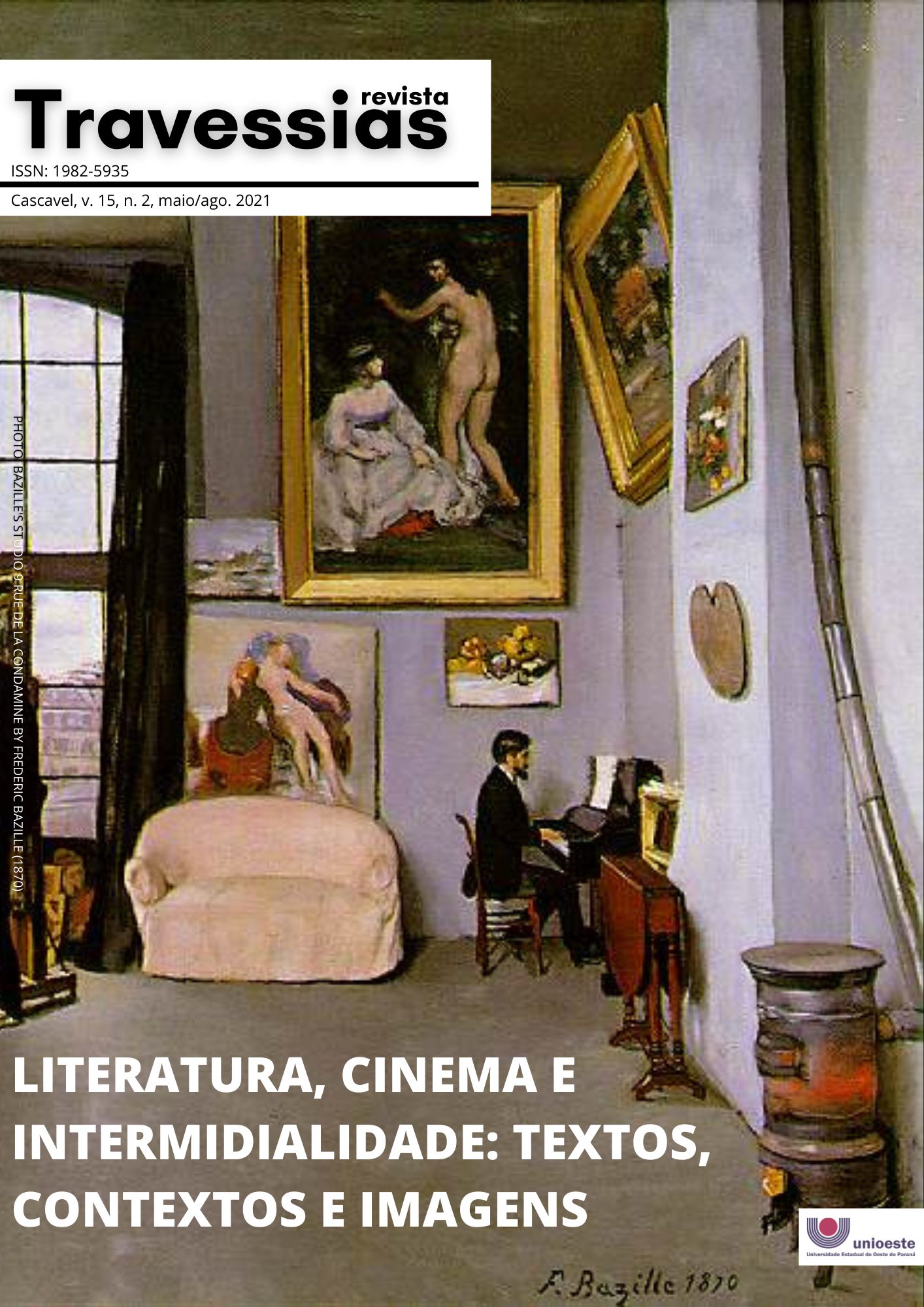Anton Chigurh: o insólito vilão de No country for old men
DOI:
https://doi.org/10.48075/rt.v15i2.27753Palavras-chave:
Literatura, Cinema, Insólito, Violência.Resumo
Este trabalho tem por objetivo analisar a representação do insólito na obra No Country for Old Men (2005), de Cormac McCarthy, contemplando, de forma mais específica, o estudo do personagem Anton Chigurh, assassino de aluguel que surge na narrativa para cumprir uma missão e que deixa um rastro tenebroso de morte e violência. Esta persona assassina, envolta em uma aura de mistério e incredulidade, torna possíveis algumas interpretações que comungam com o insólito e o fantástico, tanto no texto literário quanto na adaptação cinematográfica dirigida pelos irmãos Cohen em 2007, e gera, com isso, um rico processo de intermidialidade, o que propiciou que esses produtos artísticos alcançassem reconhecimento de crítica e de público. Com efeito, utilizaremos como metodologia de pesquisa a análise de conteúdo; quanto à forma de abordagem, caracterizamos esta pesquisa como qualitativa, e, dessa forma, utilizaremos como referencial teórico estudos que abordam temas como o insólito, o fantástico e a violência, entre os quais destacamos Garcia (2008), Todorov (1980) e Ginzburg (2012). Como resultados, evidenciamos que Chigurh desponta como a representação da morte, visível somente por aqueles que a encontram, mas sem rosto e sem pistas para aqueles que não estiveram em sua presença, tendo ainda seu caráter insólito reconhecido pelo xerife Ed Tom Bell (personagem que, na trama, representa a lei e a ordem), o qual passa a considerá-lo como um fantasma, chegando a duvidar se o assassino é mesmo um homem real, dado os seus feitos chocantes, inquietantes e singulares.Downloads
Referências
ANDRADE, E. Rotina. In: ANDRADE, Eugenio. As mãos e os frutos. Portugal: FEA, 1948.
AVELAR, I. Alegorias da derrota: a ficção pós-ditatorial e o trabalho do luto na América Latina. Trad. Saulo Gouveia. Belo Horizonte: Editora da UFMG, 2003.
BAUMAN, Z. Amor líquido. Tradução de Carlos Alberto Medeiros. Rio de Janeiro: Jorge Zahar, 2004.
GARCIA, F. (org.). Narrativas do insólito: passagens e paragens. Rio de Janeiro: Dialogarts, 2008. Disponível em: http://www.dialogarts.uerj.br/arquivos/narrativas-doinsolito.pdf. Acesso em: 29 jan. 2020.
GINZBURG, J. Literatura, violência e melancolia. Campinas: Autores Associados, 2012.
LEISTEDT, S. J; LINKOWSKI, P. Psychopathy and the Cinema: Fact or Fiction? Journal of Forensic Sciences. Belgium, v. 59, n° 1, p. 167-174, December, 2013. Disponível em: https://bityli.com/Vo4lo. Acesso em: 15 fev. 2020.
LINS, R. L. Violência e Literatura. Rio de Janeiro: Tempo Brasileiro, 1990.
MCCARTHY, C. Onde os velhos não tem vez. Tradução de Adriana Lisboa. Rio de Janeiro: Objetiva, 2010. Disponível em: http://lelivros.love/book/download-oonde-os-velhos-nao-tem-vez-cormac-mccarthy-em-epub-mobi-e-pdf/. Acesso em: 17 out. 2019.
SCHOPENHAUER, A. Metafísica do Amor, Metafísica da Morte. Disponível em: https://filosoficabiblioteca.files.wordpress.com/2013/11/schopenhauer-arthur-metafisica-do-amor-e-da-morte-pg-32-33.pdf. Acesso em: 15 fev. 2020.
TODOROV, T. Introdução à literatura fantástica. Disponível em: http://static.recantodasletras.com.br/arquivos/2260559.pdf. Acesso em: 02 fev. 2020.
Downloads
Publicado
Como Citar
Edição
Seção
Licença
Aviso de Direito Autoral Creative Commons
Política para Periódicos de Acesso Livre
Autores que publicam nesta revista concordam com os seguintes termos:
1. Autores mantêm os direitos autorais e concedem à revista o direito de primeira publicação, com o trabalho simultaneamente licenciado sob a Licença Creative Commons Attribution que permite o compartilhamento do trabalho com reconhecimento da autoria e publicação inicial nesta revista.
2. Autores têm autorização para assumir contratos adicionais separadamente, para distribuição não-exclusiva da versão do trabalho publicada nesta revista (ex.: publicar em repositório institucional ou como capítulo de livro), com reconhecimento de autoria e publicação inicial nesta revista.
3. Autores têm permissão e são estimulados a publicar e distribuir seu trabalho online (ex.: em repositórios institucionais ou na sua página pessoal) a qualquer ponto antes ou durante o processo editorial, já que isso pode gerar alterações produtivas, bem como aumentar o impacto e a citação do trabalho publicado (Veja O Efeito do Acesso Livre).
Licença Creative Commons
Esta obra está licenciada com uma Licença Creative Commons Atribuição-NãoComercial-CompartilhaIgual 4.0 Internacional, o que permite compartilhar, copiar, distribuir, exibir, reproduzir, a totalidade ou partes desde que não tenha objetivo comercial e sejam citados os autores e a fonte.



